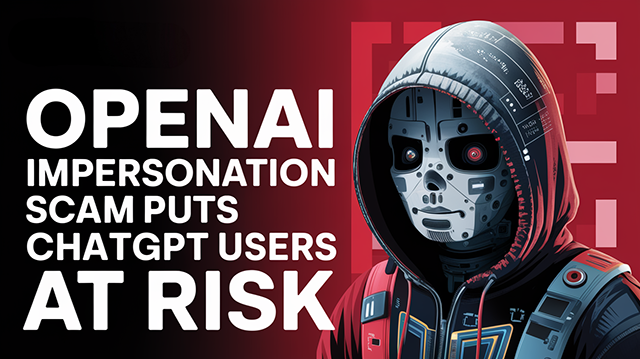OpenAI Impersonation Scam Puts ChatGPT Users at Risk

Threat Group: Unknown Cybercriminals
Threat Type: Phishing Attack
Exploited Vulnerabilities: Credential Harvesting
Malware Used: None detected, phishing-only campaign
Threat Score: High (7.5/10) — Due to scale and the use of advanced impersonation tactics.
Last Threat Observation: November 2024
Threat Group: Unknown Cybercriminals
Threat Type: Phishing Attack
Exploited Vulnerabilities: Credential Harvesting
Malware Used: None detected, phishing-only campaign
Threat Score: High (7.5/10) — Due to large-scale impersonation and use of GenAI for message authenticity.
Last Threat Observation: November 2024 by Barracuda Networks
Overview
Cybercriminals have launched a new large-scale phishing campaign impersonating OpenAI to harvest ChatGPT credentials. The attackers send spoofed emails that appear to be official OpenAI communications, alerting recipients of a "failed subscription payment" and urging them to click a link to update payment information. This campaign has been highly targeted, with phishing emails sent to over 1,000 users from a single domain. Leveraging generative AI (GenAI), attackers have improved email authenticity, further blurring lines for end users.
Key Details
- Sender’s Email Address:
- Emails originate from info@mta.topmarinelogistics[.]com, rather than an official OpenAI domain such as @openai.com. This discrepancy in the domain is a critical phishing indicator.
- DKIM and SPF Records:
- These phishing emails pass DKIM (DomainKeys Identified Mail) and SPF (Sender Policy Framework) checks, indicating they are sent from authorized servers. However, the domain is unrelated to OpenAI, signaling potential fraud.
- Content and Language:
- The email's tone is urgent, pressuring users to resolve their subscription issues immediately. This tactic is a common phishing trait, as legitimate communications from companies typically avoid such urgency.
- Contact Information:
- The email includes what appears to be a legitimate OpenAI support email (e.g., support@openai[.]com), attempting to add credibility. However, the originating domain and the context reveal its phishing intent.
- Impact of GenAI on Phishing:
- Research from Barracuda and Forrester indicates a surge in phishing and spam due to GenAI. While generative AI allows attackers to create convincing, scalable phishing emails, these attacks largely follow traditional tactics—impersonation and credential harvesting. Forrester’s and Verizon’s 2024 Data Breach Investigations Report highlights that, though GenAI aids phishing’s quality and scalability, it has yet to significantly alter cyberattack types or methods.
Attack Vectors
The attack leverages impersonation through phishing emails that purport to be from OpenAI. Recipients are led to click on links under the pretense of fixing failed payments, where they are redirected to a fake OpenAI login page designed to steal credentials. The phishing emails use different links and URLs across emails to evade detection. This approach takes advantage of GenAI to enhance the legitimacy and believability of phishing messages.
Known Indicators of Compromise (IoCs)
Domains:
- Sender domain: topmarinelogistics[.]com
- Phishing page domain: fnjrolpa[.]com (currently offline). URLs: Multiple redirect URLs in phishing emails, varying by email to evade detection filters.
Mitigation and Prevention
- Deploy Advanced Email Security Solutions:
- Use AI-powered email filtering tools that analyze sender behavior, content, and intent. Such solutions can detect and block advanced phishing attempts mimicking official communication styles.
- Continuous Security Awareness Training:
- Regularly educate employees to recognize the latest phishing tactics, such as examining email addresses and verifying unexpected requests. Simulated phishing exercises reinforce learning.
- Automated Incident Response:
- Post-delivery remediation tools can help minimize phishing impact. These solutions can automatically identify and remove all instances of malicious emails across user mailboxes.
- Two-Factor Authentication (2FA):
- Enable 2FA on all ChatGPT accounts to prevent unauthorized access even if credentials are compromised.
- Log Monitoring and Analysis:
- Monitor login and network activity for unusual patterns associated with OpenAI accounts to detect compromised accounts quickly.
Conclusion
The OpenAI impersonation campaign underscores the importance of vigilance as cybercriminals refine phishing tactics using generative AI. Organizations should strengthen their defenses by implementing comprehensive email security solutions, ongoing user education, and regular threat monitoring. By staying vigilant to common phishing red flags, businesses can mitigate risks and protect their systems against evolving cyber threats.
Sources:


